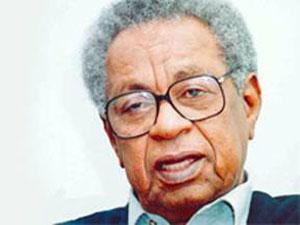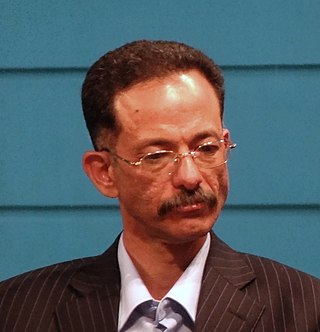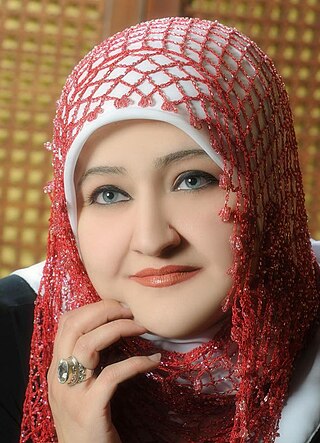Related Research Articles

Tayeb Salih was a Sudanese writer, cultural journalist for the BBC Arabic programme as well as for Arabic journals, and a staff member of UNESCO. He is best known for his novel Season of Migration to the North, considered to be one of the most important novels in Arabic literature. His novels and short stories have been translated into English and more than a dozen other languages.
Sudanese literature consists of both oral as well as written works of fiction and nonfiction that were created during the cultural history of today's Republic of the Sudan. This includes the territory of what was once Anglo-Egyptian Sudan, the independent country's history since 1956 as well as its changing geographical scope in the 21st century.

Mansoura Ez-Eldin is an Egyptian novelist and journalist.
Humphrey T. Davies was a British translator of Arabic fiction, historical and classical texts. Born in Great Britain, he studied Arabic in college and graduate school. He worked for decades in the Arab world and was based in Cairo from the late 20th century to 2021. He translated at least 18 Arabic works into English, including contemporary literature. He is a two-time winner of the Banipal Prize.
Hoda Ablan is a Yemeni poet. She was born in Ibb and studied at the University of Sanaa, obtaining a master's degree in political science in 1993. Her first collection of poetry Wurud shaqiyat al-malamih was published in Damascus in 1989. She has since published several other poetry collections. Her work has appeared in translation in several outlets including two issues of Banipal magazine. Her poetry was also anthologised in a 2001 collection titled The poetry of Arab women : a contemporary anthology, edited by Nathalie Handal.
Nabila Muhsin Ali al-Zubayr is a Yemeni poet and novelist. She was born in the village of al-Hagara in the Haraz region and studied at the University of Sanaa, obtaining a BA in psychology. In the past, she has been a regular contributor to Yemeni journals al-Thawra, al-'Uruba, al-Mithaq and al-Mar'a. Her first book of poems titled Mutawaliyat al-kidhba al-ra'i'a was published in Damascus in 1990. She has published further volumes of poetry since.
Wajdi al-Ahdal is a Yemeni novelist, short story writer and playwright. Laureate of the International Prize for Arabic Fiction (IPAF) in 2008, is known for his contemporary literary style and sometimes socially critical works, some of which have been censored in Yemen. Until 2019, he has published five novels, four collections of short stories, a play and a film screenplay.

Ali al-Muqri is a Yemeni novelist and writer. Two of his novels - Black Taste, Black Odour and The Handsome Jew - have been long-listed for the Arab Booker Prize. He also received a special commendation from the jury of the 2015 French Prize for Arabic Literature, for his novel Ḥurma, translated into French by Khaled Osman and Ola Mehanna.
Samir Abdel Fattah is a Yemeni short story writer, novelist and playwright. He was born in Jibla, Yemen in 1971, and he moved to Sanaa in 1982, where he studied economics and business at university. He is known for his short story collections, the first of which, Ranin al-matar, appeared in 2002. He has published two more collections since. He has written two novels: Riwayat al-Sayyid Mim (2007) and Ibn al-nasr (2008). He has also written plays for the theatre.
Samah Selim is an Egyptian scholar and translator of Arabic literature. She studied English literature at Barnard College, and obtained her PhD from Columbia University in 1997. At present she is an associate professor at the Department of African, Middle Eastern, and South Asian Languages and Literatures at Rutgers, the State University of New Jersey. She has also taught at Columbia, Princeton and Aix-en-Provence universities.

Issa J. Boullata was a Palestinian scholar, writer, and translator of Arabic literature.
Dima Wannous is a Syrian writer and translator. She studied French literature at Damascus University and the Sorbonne. Also, she studied translation in France and has lived in Beirut, where she worked for the newspapers Al-Hayat and As-Safir. She has also worked for broadcast media.
Jokha Alharthi, also spelt al-Harthi, is an Omani writer and academic, known for winning the Man Booker International Prize in 2019 for her novel Sayyidat al-Qamar, published in English under the title Celestial Bodies. She has written four novels in Arabic, two of which have been translated into English.

Salwa Bakr is an Egyptian critic, novelist and author. She is the author of seven volumes of short stories, seven novels, and a play. Her work has been translated into nine languages and holds international recognition.
Ibrahim Aslan was an Egyptian novelist and short story writer.
Maia Tabet is an Arabic-English literary translator with a background in editing and journalism. Born in Beirut, Lebanon, in 1956, she was raised in Lebanon, India, and England. She studied philosophy and political science at the American University in Beirut and lives between the United States and Cyprus.

Huzama Habayeb ) is a Palestinian novelist, storyteller, columnist, translator, and poet who has won multiple awards such as Mahmoud Seif Eddin ِAl-Erani Award for Short Stories, Jerusalem Festival of Youth Innovation in Short Stories, and Naguib Mahfouz Medal for Literature. Upon graduating from Kuwait University in 1987 with a Bachelor of Arts in English language and Literature, she pursued careers in journalism, teaching, and translation before she eventually started to write professionally as a published author. She is a member of both the Jordanian Writers Association and the Arab Writers Federation.

Sanaa Shalan is a Jordanian contemporary writer, from the Arab novelty generation. She writes novels, short stories, theater, scenario and children's literature. She holds a doctorate degree in modern literature. Shalan works as an instructor at the University of Jordan.
Najwa Bin Shatwan is a Libyan academic and novelist, the first Libyan to ever be shortlisted for the International Prize of Arabic Fiction. She has authored four novels: Waber Al Ahssina ; Madmum Burtuqali ; Zareeb Al-Abeed ; and Roma Termini, in addition to several collections of short stories, plays and contributions to anthologies. She was chosen as one of the thirty-nine best Arab authors under the age of forty by Hay Festival’s Beirut 39 project (2009). In 2018, she was chosen from hundreds of Arab writers for the 2018 Banipal Writing Fellowship Residency at the University of Durham and in 2020, she was chosen to co-lead a series of creative writing workshops in Sharjah for Arab writers. Also, she was chosen as a member of jury in various literary awards/grants.
Samiha Khrais, alternative spelling Samihah Kharis is a Jordanian novelist, journalist and translator. She was born in Amman and completed her primary and secondary school education in Qatar and Sudan and her university education in Egypt. For around 20 years, Khrais held a number of positions in the field of journalism, including editor-in-chief for Jordanian Hatem magazine and writer for Al-Ittihad newspaper, among others. She served as board member of the Radio and Television Department and PEN International in Jordan, and one of the founders of Emirates Writers Union. She has published over 15 literary works, and was nominated for a number of literary prizes, most notably, the Katara Prize for Arabic Novel in 2017.
References
- ↑ "Banipal (UK) Magazine of Modern Arab Literature - Contributors - Nadia Alkowkabani". www.banipal.co.uk. Retrieved 2018-03-21.
- ↑ "Al-Kokabany sheds lights on Yemeni novels and women issues". archive.is. 2012-09-19. Archived from the original on 2012-09-19. Retrieved 2018-03-21.